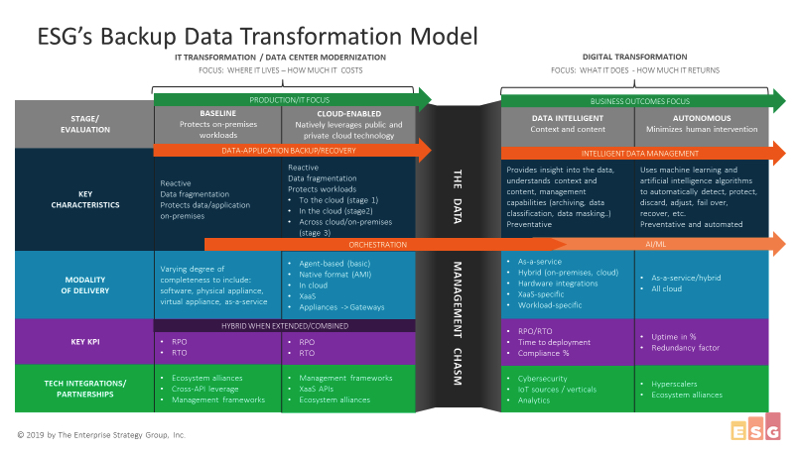Future of Backup and Recovery Is Intelligent Data Management
According to Enterprise Strategy Group
This is a Press Release edited by StorageNewsletter.com on February 14, 2020 at 2:01 pmEnterprise Strategy Group (ESG) released a research examining data usage trends and perspectives: The Evolution from backup to Data Intelligence. The research findings validate ESG’s Backup Data Transformation Model, which outlines the journey from backup to autonomous data intelligence – including the data management chasm both end-users and vendors must cross to achieve digital transformation.

With this, the term data management is redefined as Intelligent Data Management, meaning that beyond backup and recovery use cases, the solutions or systems performing these operations can also provide insight into the data, understand the context and the content of it, and deliver management capabilities.
The new study, which surveyed more than 350 North American IT professionals responsible for data protection technology decisions, found that the vague term “data management” means different things to different people. An astounding 53% admit they do not fully understand the term.
Aiming to unite vendors and end users to better understand and define this category, the study focuses on how Intelligent Data Management and reusing data can drive better business outcomes by re-focusing on and re-prioritizing the context and the content of the data.
As data becomes increasingly more vital to businesses, data reuse is perceived as the next stage of data protection and is gaining popularity as IT leaders and stakeholders recognize its power to lower business risks and foster growth and expansion. In fact, the study found that more than one third of respondents view data reuse as a top 5 data protection investment priority for their business. Understanding and classifying data is a critical step to meet stringent security and compliance mandates – while minimizing privacy and security risks, like breach risk.
“ESG’s research shows that by redefining the category and focusing on Intelligent Data Management, IT leaders, vendors and end users can unlock paths to innovation and pave the way for flourishing business growth,” said Christophe Bertrand, senior analyst, ESG. “Pervasive data classification processes translate into more positive business and security or compliance outcomes. Organizations that want or need to reuse their data should consider adapting their structure, process and people sooner rather than later to reap the most benefit from data assets.”
Additional findings and themes from the research include:
• Data reuse is the key to driving business growth and innovation: 48% expect to gain greater business efficiency-agility from data reuse. Secondary data reuse generates broad business benefits.
• Organizations that classify all of their data are much more likely to make well-informed business decisions and satisfy security and compliance regulations.
• The research shows the market needs education and maturity. IT leaders lack a sense of ROI and are met with resistance to change in evolving their data management strategies.
“The market is undergoing a fundamental shift,” Bertrand continues. “The traditional backup and recovery market is morphing and I predict that vendors who don’t adapt their offerings will see their business sharply decline in the next few years. It’s time to adapt. Our research shows that 59% perceive data reuse is the next stage of their data protection strategy.”














 Subscribe to our free daily newsletter
Subscribe to our free daily newsletter


